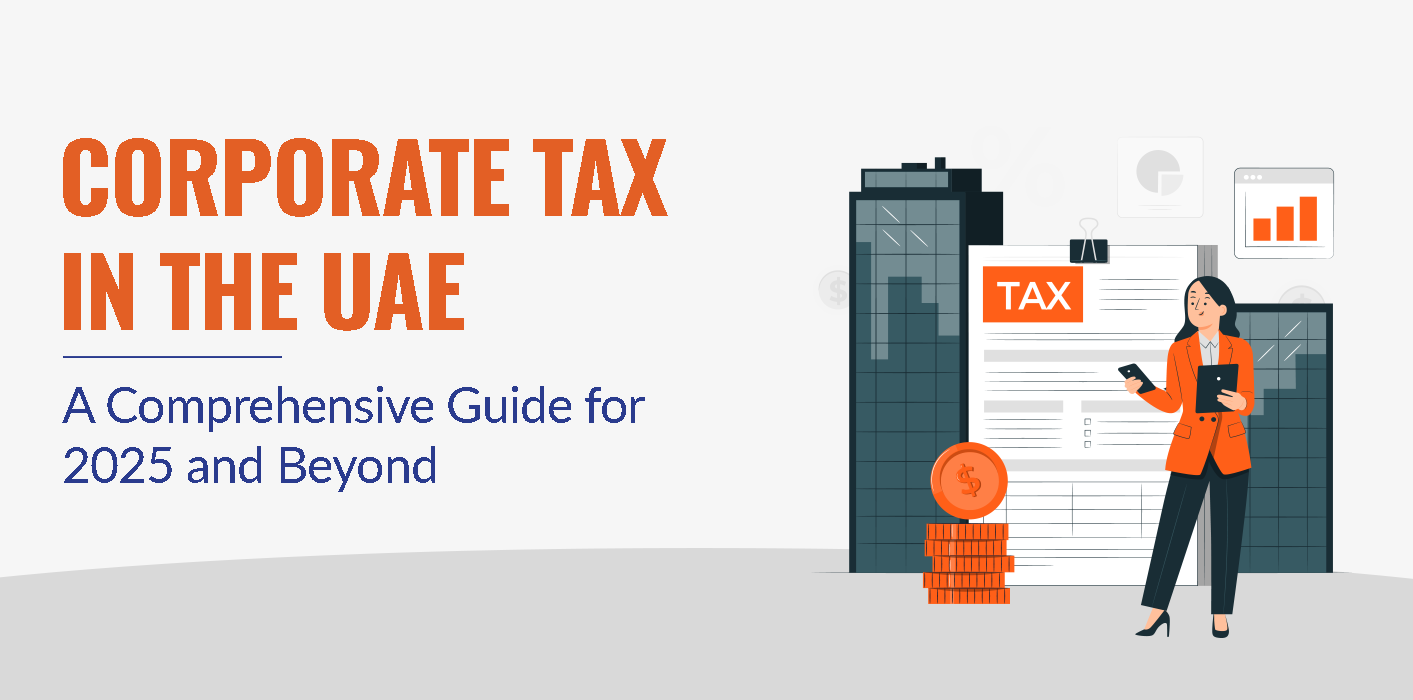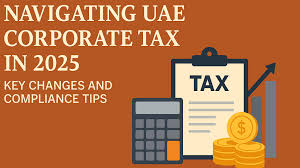Now Reading: UAE Corporate Tax 2025: What Every Business Needs to Know Now
-
01
UAE Corporate Tax 2025: What Every Business Needs to Know Now
UAE Corporate Tax 2025: What Every Business Needs to Know Now

Table of Contents
The United Arab Emirates (UAE) has embarked on a significant fiscal transformation with the introduction of a federal corporate tax (CT) regime. While the initial phase began for financial years starting on or after June 1, 2023, 2025 marks a pivotal year, particularly with the implementation of the Domestic Minimum Top-Up Tax (DMTT). This shift demands a thorough understanding from all businesses operating within the UAE, from local enterprises to large multinational corporations, to ensure compliance and strategic planning.
Understanding the Core Corporate Tax Framework

The UAE Corporate Tax Law, Federal Decree-Law No. 47 of 2022, established a tiered tax system. For most businesses, the standard rates are:
- 0% for taxable income up to AED 375,000. This threshold is designed to support small and medium-sized enterprises (SMEs) and start-ups, promoting economic growth.
- 9% for taxable income exceeding AED 375,000. This is the general corporate tax rate applicable across mainland UAE businesses.
This framework aims to align the UAE with international tax transparency standards, particularly those championed by the Organisation for Economic Co-operation and Development (OECD) through its Base Erosion and Profit Shifting (BEPS) initiative. The introduction of CT also serves to diversify the UAE’s revenue streams, reducing reliance on oil and gas.
The Impact of Domestic Minimum Top-Up Tax (DMTT) in 2025

A critical development for 2025 is the introduction of the 15% Domestic Minimum Top-Up Tax (DMTT), effective January 1, 2025. This tax specifically targets large multinational enterprises (MNEs) with consolidated global revenues exceeding EUR 750 million (approximately AED 3.15 billion) in at least two of the four preceding financial years.
The DMTT is a direct response to the OECD’s Pillar Two framework, which seeks to ensure that large MNEs pay a minimum effective tax rate of 15% on their profits globally. If an MNE’s effective tax rate in the UAE falls below this 15% threshold, the DMTT will levy an additional tax to bridge the gap. This means that even if a large MNE operating in the UAE is paying 9% corporate tax, they may still be liable for an additional 6% top-up tax to meet the global minimum.
For MNEs, this necessitates a comprehensive reassessment of their global tax strategies, including:
- Effective Tax Rate (ETR) Calculation: MNEs must accurately calculate their ETR across all jurisdictions, including the UAE, to identify any potential shortfalls against the 15% minimum.
- Reevaluating Free Zone Strategies: While Free Zones traditionally offered 0% tax rates, the Pillar Two rules might necessitate a re-evaluation of whether existing Free Zone entities still provide a global tax advantage, as the MNE group might still be liable for top-up tax.
- Transfer Pricing Compliance: Scrutiny on related-party transactions will intensify. MNEs must ensure all intercompany transactions adhere to the arm’s length principle and maintain robust transfer pricing documentation, including Master Files, Local Files, and Country-by-Country Reports (CbCR) if applicable.
Free Zones: Navigating the New Tax Landscape
Free Zones have been instrumental in attracting foreign investment to the UAE, largely due to their historical zero-tax policies. While the introduction of corporate tax means all Free Zone entities are now subject to the law, a preferential 0% corporate tax rate on “Qualifying Income” remains available for “Qualifying Free Zone Persons” (QFZPs).
To maintain this 0% rate, Free Zone entities must meet stringent criteria, including:
- Maintaining Adequate Substance: Demonstrating a genuine economic presence in the UAE with sufficient physical assets, employees, and operational activities.
- Earning Qualifying Income: The income must predominantly be derived from qualifying activities, typically exports or inter-Free Zone dealings, and not from mainland UAE clients unless specific exemptions apply.
- Compliance with Regulatory Requirements: Adhering to all relevant regulations, including mandatory annual audited financial statements.
- Not Electing for Standard Taxation: The Free Zone entity must not choose to be subject to the standard 9% corporate tax rate.
Any income that does not meet the “qualifying income” criteria will be subject to the standard 9% corporate tax rate. This necessitates a detailed review of revenue streams and operational structures for Free Zone businesses to ensure continued eligibility for preferential rates.
Compliance Requirements for All Businesses

Regardless of size or Free Zone status, all businesses operating in the UAE are now subject to specific corporate tax compliance obligations:
- Registration: Every taxable person, even those with zero taxable income or operating in Free Zones, must register with the Federal Tax Authority (FTA) and obtain a Corporate Tax Registration Number (TRN). Deadlines vary based on incorporation date and whether a permanent establishment existed prior to specific dates. Generally, newly incorporated entities must register within three months of incorporation.
- Financial Record Keeping: Businesses are mandated to maintain accurate financial records for a minimum of seven years. Financial statements must be prepared in accordance with International Financial Reporting Standards (IFRS) to facilitate accurate tax calculations.
- Annual Tax Return Filing: A Corporate Tax return must be filed online with the FTA within nine months after the end of the tax period. Even entities with zero taxable income are generally required to file a “nil” return.
- Payment of Tax: Any corporate tax due must be settled within the same nine-month period after the end of the tax period.
- Transfer Pricing Documentation: Businesses engaging in transactions with related parties must ensure these are at arm’s length and maintain supporting documentation, particularly for larger entities.
Small Business Relief and Exemptions
To further support smaller businesses, the UAE Corporate Tax Law provides for “Small Business Relief.” Eligible businesses with revenue below AED 3 million (until December 31, 2026) can elect for this relief, effectively treating their taxable income as zero for the relevant tax period, thereby exempting them from corporate tax. However, even with this relief, registration and annual filing obligations remain.
Certain entities and income streams are also exempt from corporate tax, including:
- Government entities and government-controlled entities engaged in sovereign activities.
- Qualifying public benefit entities.
- Qualifying investment funds.
- Dividends and capital gains from qualifying shareholdings (meeting specific ownership and holding period criteria).
- Income earned by individuals from employment, bank deposits, or personal real estate investments.
Strategic Imperatives for Businesses
The UAE’s evolving tax landscape demands proactive engagement and strategic adaptation from all businesses. Key imperatives include:
- Conducting a Tax Impact Assessment: Understand how the corporate tax regime specifically affects your business model, revenue streams, and cost structures.
- Reviewing Financial Systems: Ensure accounting systems are robust and capable of generating IFRS-compliant financial statements and tracking all deductible expenses and exempt income.
- Seeking Expert Advice: Engage with tax consultants and legal professionals to navigate the complexities of the new regulations, especially concerning Free Zone operations, MNE obligations, and specific reliefs.
- Employee Training: Educate finance and accounting teams on the new tax laws, compliance requirements, and reporting obligations.
- Proactive Planning: Develop a strategic tax plan that incorporates the new regulations, optimizes deductions, and leverages available reliefs to manage tax liabilities effectively.
The implementation of corporate tax, particularly with the DMTT in 2025, signifies a maturing of the UAE’s fiscal environment. While it introduces new complexities, it also reinforces the UAE’s commitment to international standards and its position as a transparent and globally integrated business hub. Businesses that proactively embrace these changes will be well-positioned to continue thriving in this dynamic economy.
WATCH MORE: https://www.youtube.com/watch?v=ocGT3InbKoU
READ MORE: Cryptocurrency Taxation in the UAE: A Comprehensive Guide for 2025






















